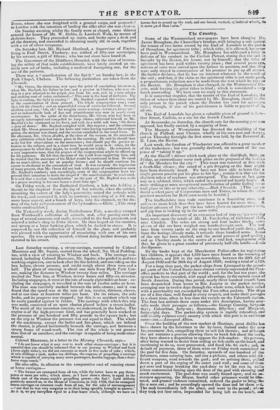Last Saturday morning, a steam-carriage, constructed by Colonel Macerone and
Mr. Squire, started from the wharf, No. 19, at Padding- Last Saturday morning, a steam-carriage, constructed by Colonel Macerone and Mr. Squire, started from the wharf, No. 19, at Padding- ton, with a view of running to Windsor and back. The carriage con- tained, including Colonel Macerone, Mr. Squire, who guided it, and two working-engineers, one to look after the fire behind, and one riding on the box before, eleven persons, and might weigh about three tons and a half. The place of starting is about one mile from Hyde Park Cor- ner, making the distance to Windsor twenty-four miles. The carriage reached the New Inn, at Windsor, in two hours and fifty-six minutes. Including stoppages, it went at the rate of nearly eight miles an hour : ex- cluding the stoppages, it travelled at the rate of twelve miles an hour. The time was carefully marked between the mile-stones ; and it was found that the speed was at the rate of ten, twelve, thirteen, eleven, and at one time at fourteen miles per hour. On its return, the axle broke, and its progress was stopped ; but this is an accident which can be easily guarded against in future. The carriage with which this trip was made, consisted of an open chariot placed before a steam-boiler. The merit of the invention consists, we understand, in the boiler. The engine is of the high-pressure kind, and has generally been worked at the pressure of one hundred and fifty pounds to the square inch; but
on the trip to Windsor the pressure was not equal to that. The whole
of the machinery, except the boiler and fire-place, which are behind the chariot, is placed horizontally beneath the carriage, and between a strong frame of wood-work. The size of the whole is not greater than that of an omnibus, and the carriage is capable of being made orna- mental.
Colonel Macerone, in a letter to the Morning Chronide, says- " I do not know what it may cost to work other steam-carriages ; but it is essential that you should be informed that in our journey to Windsor and back (forty-eight miles), we did not consume so much as five sacks of coke ; which, at two shillings a sack, makes ten shillings, the expense of propelling a carriage which is capable of carrying many more passengers, besides luggage, than a four- horse stage-coach."
He also adds, in allusion to the comparative cost of running steam or horse carriages-
" The former are exempted from all tax while the latter have to pay three- pence or more per mile;- which alone,sasI have shown above, is equal to the whole cost of the steam-coach's propelling power—the fuel ! Lord Althorp positively assured us, in the House of Commons, in July 1832, that he exempted steam-carriages on common roads from all tax, for the sake of encouragement not that he was very sanguine as to their being speedily brought to answer.' As it is, we pay turnpikes Neel to a four-horse Petit, although we have no
horses feet to pound up the road, and our broad, vertica, cylindrical wheels, ea it more good than Lana."
















 Previous page
Previous page